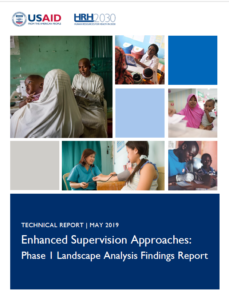27 Jun Enhanced Supervision Approaches: Landscape Analysis
 Effective health worker supervision approaches and practices are essential elements that help compensate for shortfalls in HRH training, management, and efforts to improve quality of health services. Defined as “a broad set of supervisory interventions that improve provider performance through team-based learning approaches, including supportive supervision, the use of checklists, and in-person visits,” enhanced supervision is estimated to have the highest potential impact of all health systems interventions (USAID, 2017). But which strategies are most effective? Can strategies be adapted for different settings; monitored; improved?
Effective health worker supervision approaches and practices are essential elements that help compensate for shortfalls in HRH training, management, and efforts to improve quality of health services. Defined as “a broad set of supervisory interventions that improve provider performance through team-based learning approaches, including supportive supervision, the use of checklists, and in-person visits,” enhanced supervision is estimated to have the highest potential impact of all health systems interventions (USAID, 2017). But which strategies are most effective? Can strategies be adapted for different settings; monitored; improved?
HRH2030’s landscape analysis report classifies and summarizes the most impactful enhancements for health workforce supervision and what direct effects enhanced supervision has been documented to have on maternal, newborn, and child health; HIV; family planning and reproductive health; and/or other service delivery outputs, or health outcomes.
Associated Content:
Landscape Analysis Findings Report [40 pages]
Landscape Analysis Highlights [6 pages]
Landscape Analysis Inventory of Enhanced Supervision Approaches [Excel file]
Case Study on Mentorship and Enhanced Supervision for Health Care and Quality Improvement (MESH -QI) [9 pages]
Case Study on the Health Network Quality Improvement System (HNQIS) [8 pages]
Additional Content:
Landscape Analysis Preliminary Findings presentation (April 9-10, 2019)
Country: Global
Resource Types: Report, Technical Brief, Tool
Topic: Health Workforce Productivity and Performance
DOWNLOAD





